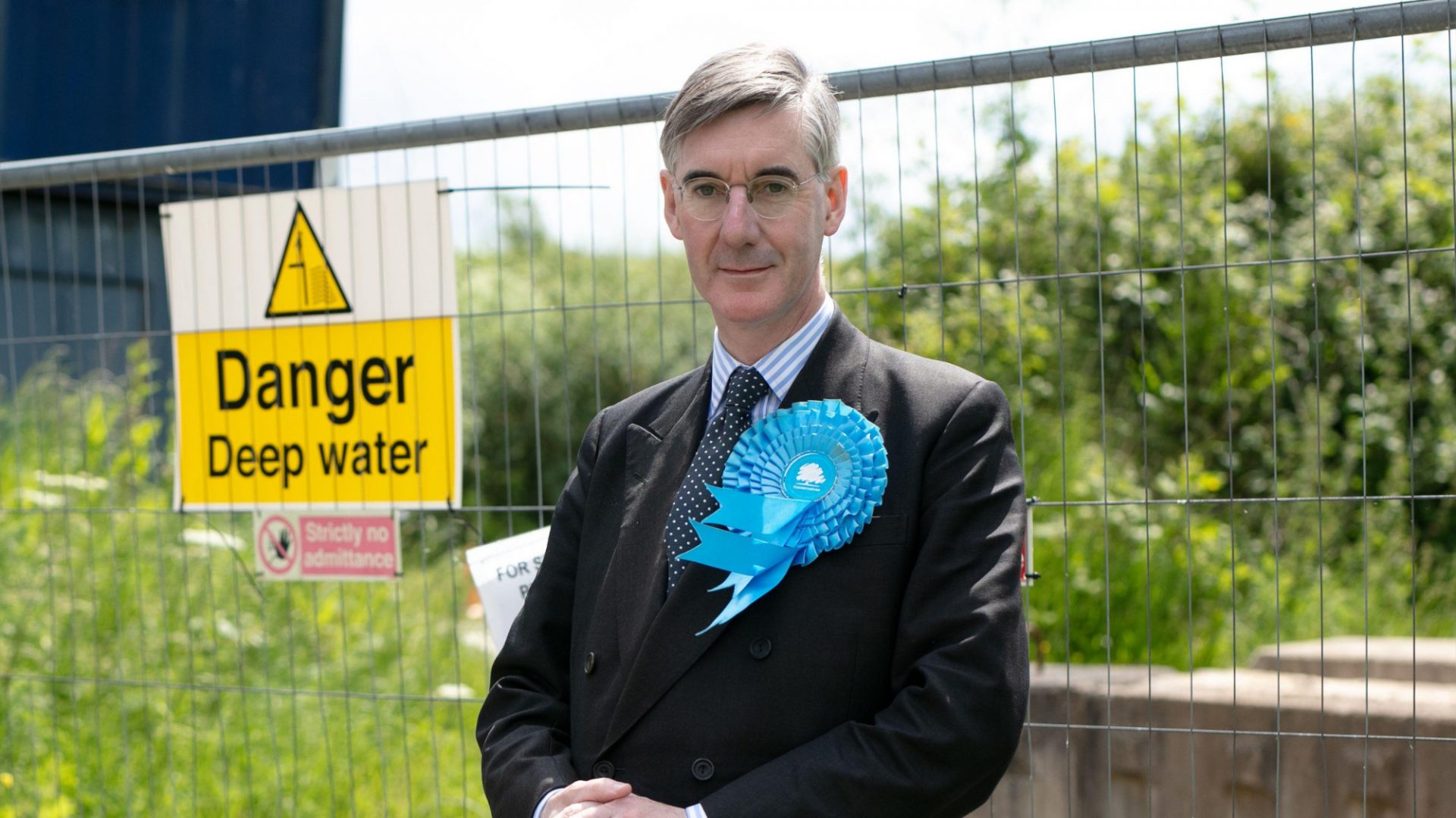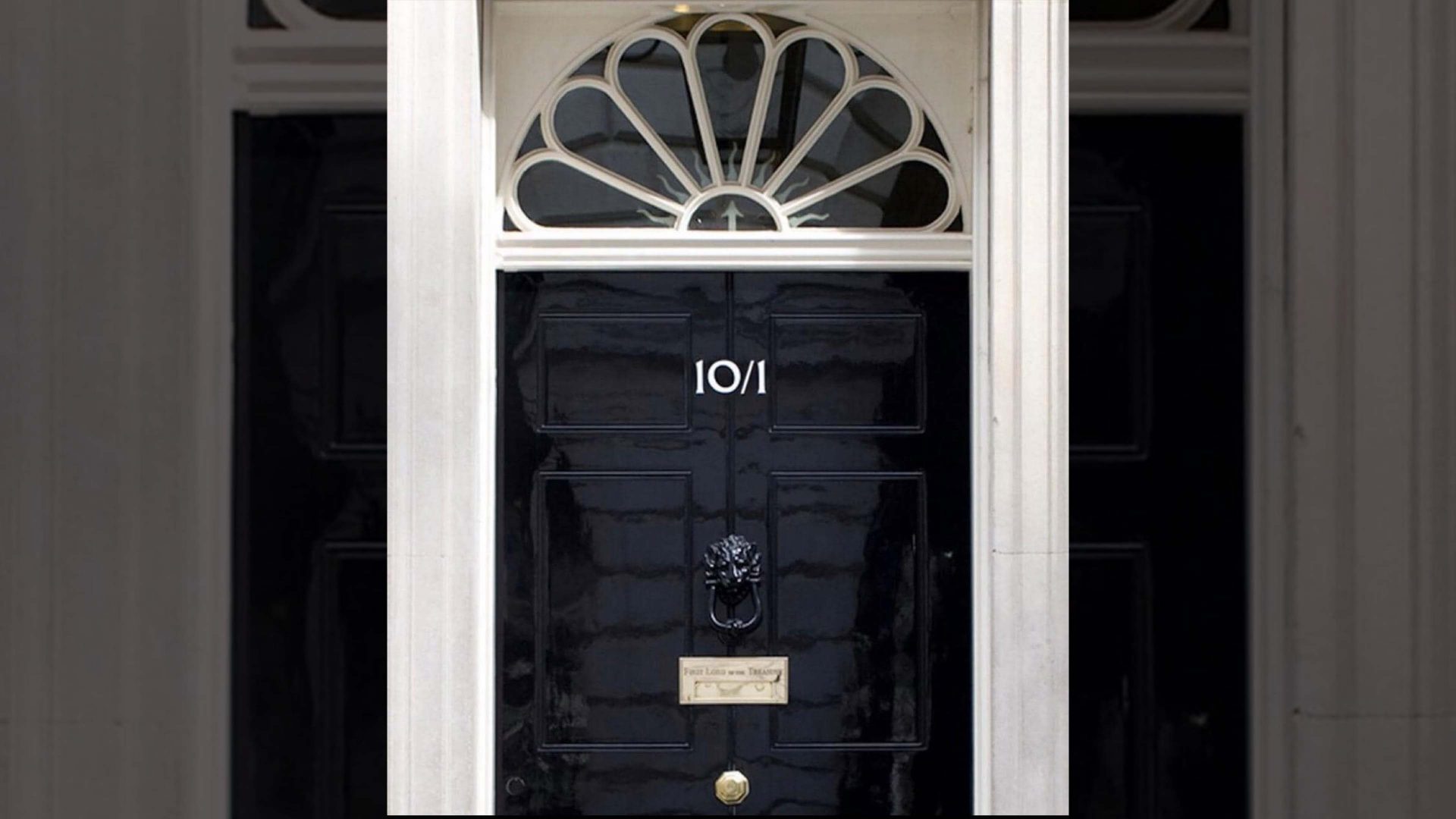The comprehensive YouGov MRP poll published on June 4 showed not only that a dozen cabinet ministers may lose their seats on July 4, but that Jacob Rees-Mogg could well fall foul of a Labour landslide too. He won North East Somerset with a majority of 14,729 in 2019, but the poll had him losing the redrawn constituency of North East Somerset and Hanham to Dan Norris, the West of England’s Labour mayor, by 34 points to 40.
Could that really happen? Could the ultimate right wing Conservative ideologue, the man who engineered the hardest possible Brexit and propelled both Boris Johnson and Liz Truss into No 10, be about to get his just reward? Could his defeat on election night eclipse even the famous “Portillo moment” of 1997, when the Tory defence secretary lost his seat in Enfield Southgate?
I resolved to visit Somerset to find out, but tracking down Rees-Mogg proved surprisingly difficult. Campaigning candidates usually welcome publicity, but not this one. My emails to him and his constituency association went unanswered. I called his agent, but she could not, or would not, tell me his movements.
I got hold of Rees-Mogg’s mobile number. He failed to answer repeated calls, so I texted him. He finally replied that he had, alas, another journalist accompanying him on the day of my visit. How about the following day, I replied. Sorry, but he had another journalist coming that day, too. And three the following week, “which I think is enough for one campaign”.
I recalled that a Daily Telegraph journalist had not only spent a day on the campaign trail with Rees-Mogg the previous week, but had stayed the night at Gournay Court, his 400-year-old mansion in the picturesque village of West Harptree beneath the Mendip Hills.
Was there not a case for talking to publications that did not share his political views, I texted back. “Indeed there is,” Rees-Mogg replied, but “I have already accepted too many requests and each one disrupts campaigning to some extent.”
I drove down to Somerset anyway, and presented myself at the constituency Conservative Association’s offices in an alley off Keynsham High Street. Prominently displayed on the walls were portraits of Rees-Mogg, Johnson and Winston Churchill but none, I noticed, of Rishi Sunak. The one person there – a silver-haired woman – said she had no idea where Rees-Mogg was campaigning that day.
Seemingly defeated, I went to meet his opponent, Norris, at a demonstration against the use of toxic waste to fill a disused quarry in the lush green countryside outside Keynsham. There my luck turned – for who should turn up in a dark blue Jaguar, wearing his trademark double-breasted suit and a large blue rosette, but the tall, stick-thin figure of Rees-Mogg himself.
Only a slight smudge of suntan cream on his nose detracted from his immaculate, if distinctly unrural, appearance. I was reminded of the Economist’s description of him as “the blue passport in human form, the red telephone box made flesh, the Royal Yacht Britannia in a pinstripe suit”.
One of the demonstration’s organisers told me, sotto voce, that he had changed his mind and agreed to come only after he learned that Norris was attending.
But let me give credit where credit is due. In person, Rees-Mogg is an impressive campaigner. He is impeccably well-mannered. He has a disarming old-school charm and civility. He has a sonorous voice, and that politician’s knack of making whoever he is speaking to feel special. He greeted every one of the 30-odd demonstrators, shook their hands, inquired after their health and posed cheerily for photos. He held centre stage, effectively sidelining Norris and the Green Party candidate, Edmund Cannon.
In short, the Rees-Mogg that Somerset voters see is a far cry from the extreme right wing zealot who stalks Westminster; who promoted a catastrophically hard Brexit; who conspired to topple Theresa May, championed the disastrous premierships of Johnson and Truss, and served in both of their cabinets; who was educated at Eton and Oxford and is one of Westminster’s richest men, but now decries the elite establishment that he personifies; who scorns “climate alarmism”; who opposes gay marriage and abortion in any circumstance; routinely votes against additional taxes on the wealthy or higher welfare benefits, extols food banks and once suggested that victims of the Grenfell Tower fire should have used their “common sense” and got out. He wants his party to offer Nigel Farage a ministerial post, and believes a re-elected Donald Trump would be better for Britain than Joe Biden.
A One Nation or Compassionate Conservative, Rees-Mogg emphatically is not. Matthew Parris, the Times columnist and former Tory MP, once wrote of him: “His manners are perfumed but his opinions are poison. Rees-Mogg is quite simply an unfailing, unbending, unrelenting reactionary.”
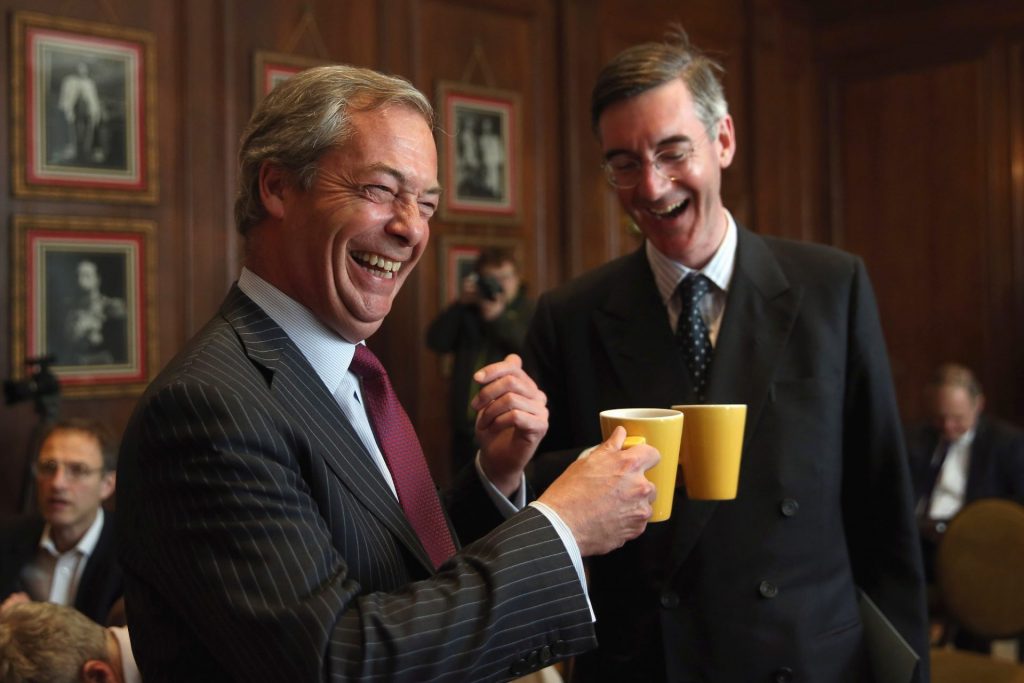
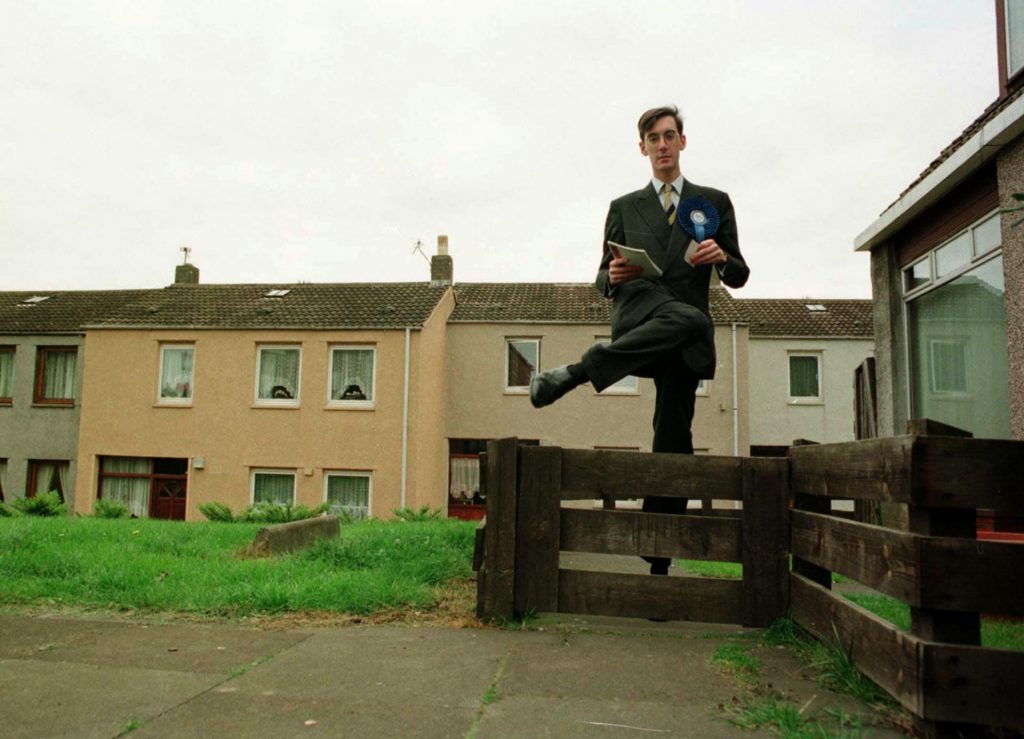
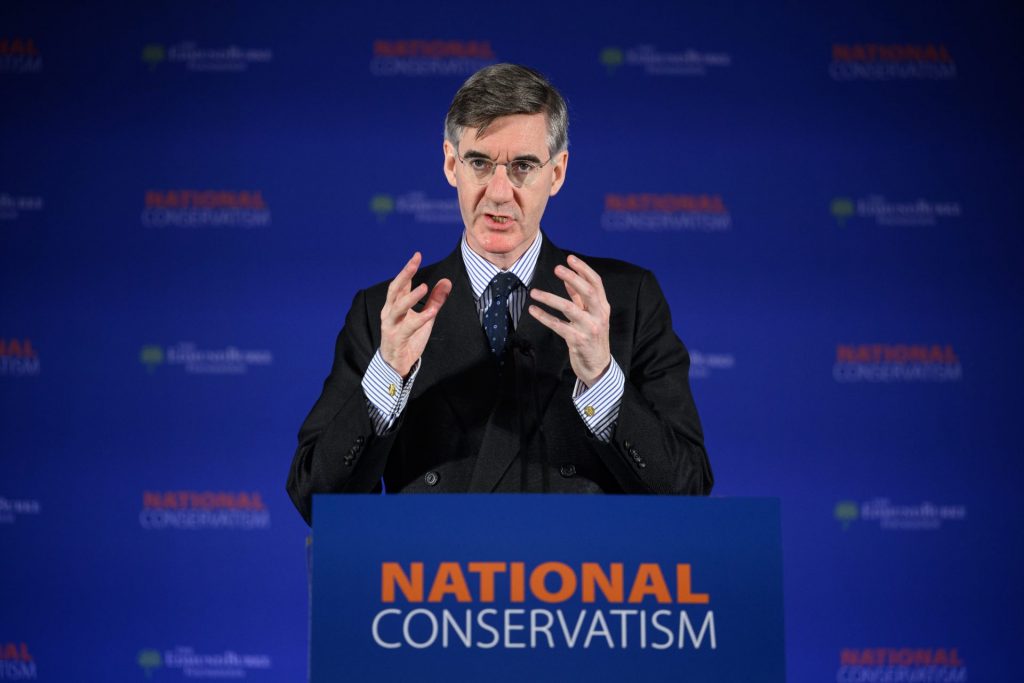
He did finally deign to speak to me as the demonstration wound down. “You just came at a time when I had lots of things booked in,” he explained.
I asked about the YouGov poll. “The polling for the Conservative Party is not good at the moment. It would be ridiculous to pretend otherwise,” he said, but added that so far the campaign had been “encouraging” and his reception on doorsteps “very friendly”. Could he buck the national trend? “There’s very little personal vote in British politics, even in North East Somerset,” he replied a little disingenuously.
In truth, Rees-Mogg will have to rely almost entirely on his personal vote to save his skin in a constituency where the Conservatives were, by their own admission, “wiped out” in the Bath and North East Somerset Council elections that took place in May. Even their leader on the council, Vic Pritchard, was defeated in the Chew Valley ward in the constituency’s rural, traditionally Tory heartland.
Rees-Mogg might just manage to do so, and he is campaigning seven days a week with a break only for Sunday morning mass.
The son of William Rees-Mogg, the former editor of the Times, he grew up in a constituency that he calls “God’s own country” – a storybook England of great estates, lush green farmland and gorgeous stone villages clustered around ancient, steepled churches.
He spent the first years of his life in an imposing Georgian pile called Ston Easton Park, was raised (by his nanny) in the splendid Old Rectory in Hinton Blewett. He now resides with his wife and six children in Gournay Court when not at his elegant Westminster townhouse.
He has represented North East Somerset for 14 years, winning four elections. His present constituents all know of him, most have met him and many have fallen for his charm. Even Norris accepts that “he’s an assiduous and conscientious constituency MP”.
Of five passers-by I spoke to at random on Keynsham High Street, three supported him. “His standards and family values align with my own,” Mary O’Brien, a retired carer, told me. “I think he suits the constituency well. He’s often seen here. He makes himself accessible. I highly rate that man.”
The national Conservative Party’s deep unpopularity apart, Rees-Mogg’s big problem is that his constituency has been radically reshaped by boundary changes. Some former mining communities on its south-eastern fringe have been consigned to the neighbouring constituency of Somerton and Frome, which probably helps him. But to its predominantly affluent, rural, village heartland has been added a large swathe of suburban Bristol and South Gloucestershire centred on Hanham. That is much less fertile territory for an MP dubbed “the Honourable Member for the 18th Century”.
In earlier times a majority of those 32,000 newly transplanted voters might well have leaned Conservative, but not now – not after 14 years of increasingly chaotic and incompetent Tory rule. Before the boundary changes they formed nearly half of the Kingswood constituency where, in February, Labour overturned a Tory majority of 11,220 in a by-election triggered by the resignation of Chris Skidmore, a former minister appalled by his government’s dilution of its commitment to Net Zero.
To compound Rees-Mogg’s difficulties, Labour and the Liberal Democrats have both selected serious candidates to run against him, not the usual tokens.
From 1997 to 2010, Norris was Labour MP for Wansdyke, a constituency very similar to the new one, and served as a junior environment minister under Gordon Brown. He lost to Rees-Mogg when Wansdyke, shorn of its suburban areas, was incorporated into North East Somerset in 2010, but he was elected West of England mayor in 2021 with Keir Starmer’s support.
While campaigning, the two men were famously thrown out of the Raven, a pub in Bath, by a landlord who objected to Labour’s support for the Covid lockdown. Norris lives in North East Somerset, and his patch covers Bath, Bristol, South Gloucestershire and North East Somerset, meaning he is Rees-Mogg’s constituent and vice-versa.
Norris has certainly raised the profile of a mayoral post previously so obscure that Boris Johnson forgot the name of the previous Tory incumbent during a campaign visit to South Gloucestershire. He was described to me by one local journalist as “an unbelievable self-promoter”. He campaigns with his dog, Angel, in tow, and recently sparked controversy by spending £10,000 on a wrap-around advertisement on a bus showing him and Angel.
The Lib Dem candidate, Dine Romero, is a former mayor of Bath and a veteran councillor. She and Norris could split the anti-Tory vote, of course. Or they could attack Rees-Mogg on two fronts, with the Lib Dems attracting disgruntled Tories in rural areas and Labour doing so in suburban ones.
One further headache for Rees-Mogg is that Farage’s Reform Party is also running a candidate, Paul MacDonnell. He threatens to steal some right wing Tory voters despite Rees-Mogg’s hard line on issues like immigration and his vocal support for Farage, his fellow GB News presenter.
Asked where he disagreed with Rees-Mogg, MacDonnell told me: “I agree very much with what he says. I only disagree with the fact he doesn’t disagree with his party decisively enough… I think he’s pretty sound – but I’m sounder.” I put this to Rees-Mogg at the demonstration. “I’ve said this to Nigel,” he laughed. “I think Nigel and I should be in the same party, and he says we should be too, but we’re not.”
The Telegraph journalist who spent a day on the campaign trail with Rees-Mogg reported that “after several hours of meet-and-greet akin to an Oscars red carpet, I’m convinced Sir Jacob will slip home on July 4”.
I’m less sure. The voters of rural Somerset may still be fond of their resident toff, but he has no personal following in the substantial chunk of Bristol suburbia that has been added to his constituency. It is not his natural territory. It is far less susceptible to his undoubted charm. It is a lot more likely to see his less savoury side, and to vote in line with the national trend.
I conducted a second survey on Hanham High Street. Admittedly it was random and deeply unscientific, but the result was strikingly different to what I found in Keynsham.
Of the 10 people I approached, just one elderly man was inclined to vote for Rees-Mogg, while most recoiled from the very idea. They variously described him as “stuck-up”, “privileged and untrustworthy” and a “pompous know-all”. Cavan Scott, a writer, said: “I can’t stand the man.” Julia Nott, a Tesco worker, said: “He lives a lifestyle completely different from everyone else.” Two people remembered him lounging arrogantly and disdainfully along the front bench during a Brexit debate in the Commons.
The manager of a small food and drinks firm said his business had been “massively hurt” by Brexit, and accused Rees-Mogg of being “completely detached from how hard everyday life is for ordinary people”. He would have derived little consolation from Rees-Mogg’s reply later in the day when I asked him what benefits Brexit had brought to Somerset. “Democracy,” he replied. “We now make our own laws. We don’t get told what laws to make by other people.”
Norris is determined to ensure that Rees-Mogg is held to account for his record, for supporting Johnson and Truss, and for the damage that they both did to Britain. “He’s very disarming,” he says. “That was particularly effective when he started out, but I think it’s worn a bit thin now.
“People are not daft. They can see that people may have good manners and a good glad-handing technique, but at the end of the day it’s what they do – not what they say.”

